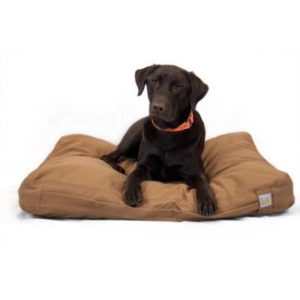Nipping, Chewing and Biting! Oh my!
One of the first things that you will notice when you bring your new puppy home is that he is a biting, nipping machine. He will attack your toes and fingers with wild abandon. The second thing you will notice is that he is equipped with a full set of razor sharp teeth that are quite capable of breaking skin and drawing blood.
Nipping, chewing and biting behavior is more than a little unpleasant – so let’s look at the reasons behind it and the best way to change the behavior.
Most puppies learn basic bite inhibition and puppy manners while with their Mom and litter mates. This is why it is so important for puppies to stay with moms for a minimum of 9 to 12 weeks. During this period of time, puppies also need lots of socialization with people and other animals. They truly need the social interaction to grow and understand how to interact with the world.
NOTE: Before taking a puppy into the world, make sure that it is up to date on all vaccinations.
WHY DO PUPPIES NIP, CHEW AND BITE?
- Play – Puppies have no thumbs! They use their mouths to play with their litter mates or interact with their human family.
- Teething – Incessant chewing helps to soothe sore gums.
- Boredom – Pups are easily bored! When they have extra time on their paws, they chew to help alleviate the boredom.
- Curiosity – Watch out if something chew worthy has been left lying within your puppy’s reach. Be sure to pick up items that you do not want your puppy to chew on. He cannot tell the difference between a hundred dollar pair of leather boots and a squeaky toy.
Puppies are little and cute, but take care not to allow or encourage your puppy to chew on fingers and toes – or worse yet on earlobes and noses. Puppies can get carried away, and you might end up with an undesired body piercing.
It is much more difficult to stop a learned behavior that it is to prevent it in the first place. Do not tolerate nipping, chewing and biting from your puppy!
TRAINING STRATEGIES
Puppies use their mouths when interacting with their litter mates. If they play too rough or bite down too hard the other pup will squeal and walk away from the game. This teaches the offending puppy that when he behaves badly the game will end. The pup soon realizes that his behavior is not being rewarded and he will learn to use his mouth in a gentler fashion. The goal is to mimic this behavior at home.
Nipping & Biting
- When your pup begins to chew on your feet or hands, immediately Yelp! loudly and remove your hands or feet away from the puppy.
- Ignore your puppy for approximately 15 seconds and try again.
- If the puppy continues to bite, leave the room or give him a “time out”.
- Never allow your puppy to chew or bite, and use this method consistently.
Chewing
- When your pup is chewing on things that are inappropriate, remove the item from your puppy’s mouth and replace it with an appropriate toy or snack.
- Do not force the item out of his mouth if he won’t give it up – offer him a better alternative!
- After the puppy releases the item, be sure to praise profusely for the correct behavior.
- When teething, puppies gums hurt, and they will chew on anything available to relieve their discomfort. It is important to provide chew toys that can help them survive this difficult time.
- Teach your puppy the difference between dog toys and items that are off limits. Set “traps” that make the dog’s items fun to chew and off limits items unpleasant. Leave off limits items on the floor, but spray them with a foul-tasting deterrent spray such as Bitter Apple or Bitter End.
- Add fun dog-appropriate items to the mix. When your puppy picks up a forbidden item, it will taste bad and he will spit it out and move on to a fun toy.
Offer praise when your puppy is chewing something that you approve of. Never miss the opportunity to reward correct behavior. A bored puppy will find entertainment. Generally, this does not turn out well for us or any possessions that we might leave within easy reach.
Always leave plenty of chew toys and games around for your puppy. Click here for puppy entertainment recommendations!
